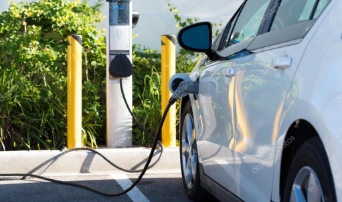In a recent development that has sent ripples through the automotive industry, Tesla, Ford Motors, and General Motors have joined forces in a groundbreaking deal pertaining to electric vehicle charging stations. This strategic collaboration has not only generated significant buzz but has also sparked debates about the potential monopoly of Tesla in this rapidly expanding field. As an automotive dealer with a rich legacy of 50 years, I firmly believe in the merits of the franchise system. In this article, I will delve into the value of franchising, discuss the challenges faced by manufacturers in the charging business, and shed light on the promising future of electric vehicle charging infrastructure.

The franchise system, long-established and proven in the United States, serves as an effective mechanism for safeguarding dealerships’ interests. By offering legal and operational protections, this system empowers dealers to operate independently within the framework set by the parent company. It ensures a level playing field, allowing dealers to compete effectively while leveraging the brand recognition and support provided by the manufacturer. This symbiotic relationship between manufacturers and dealers is vital for sustainable growth and long-term success in the automotive industry.
Building a robust electric vehicle charging infrastructure requires rapid scaling, a substantial investment, and extensive lobbying efforts to secure direct selling points in various states. However, manufacturers often face limitations in their ability to act swiftly due to bureaucratic processes and potential legal ramifications. Furthermore, they must navigate potential lawsuits from franchised dealers who have already made investments in charging station infrastructure based on earlier requirements and now must adapt to this new development. These challenges necessitate a careful approach to ensure a smooth transition and avoid disrupting the existing dealer network.
Despite these hurdles, relying on the existing franchising infrastructure presents a viable solution for rapid expansion and scalability based on market demands. Franchised dealerships are uniquely positioned to leverage their extensive network and expertise to facilitate the establishment of charging stations. By tapping into the knowledge and resources of dealers who are deeply rooted in local communities, manufacturers can expedite the deployment of charging infrastructure, effectively meeting the growing needs of electric vehicle owners across the country. This collaboration between manufacturers and dealers not only strengthens their bond but also fosters a spirit of innovation and progress.
While the franchising model offers significant advantages, it is essential for industry businesses and dealers to exercise caution when making purchasing and investment decisions in charging infrastructure. As technology continues to advance and economies of scale are realized, the prices of chargers are expected to decrease. Moreover, regulatory requirements are likely to evolve, necessitating adaptations to charging station specifications. Therefore, it is advisable for businesses to meet the minimum current requirements and refrain from excessive investments until the market stabilizes, mitigating potential financial risks.
In conclusion, the recent partnership between Tesla, Ford Motors, and General Motors highlights the importance of franchising in the context of electric vehicle charging infrastructure. The franchise system offers legal and operational protection while ensuring a level playing field for dealerships. Manufacturers, faced with challenges in acting swiftly, can benefit from the existing franchising infrastructure to rapidly expand and meet the market demands. By leveraging the knowledge and resources of dealers, the deployment of charging infrastructure can be expedited, leading to a more robust and accessible charging network for electric vehicle owners. As the industry continues to evolve, it is crucial for businesses to make informed investment decisions and adapt to the changing landscape, ensuring a sustainable and prosperous future for electric mobility.

